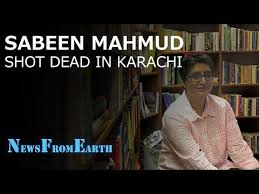
KARACHI, April 25: Those who knew her will remember her smiling. Sabeen Mahmud was a bastion of art in a forsaken city, a city where 20 million live a life of death. In a city of lifeless droves, Sabeen was alive. Today, she is more alive than ever. She is alive because one cannot imagine she is not. She is alive because if she isn’t, are we? No, we’re dead. She’s alive.
She turned the T2F into a haven of art. If you wanted a space to have a stimulating conversation over a cup of coffee, you went to T2F. If you wanted a space to perform, you went to T2F. If you wanted to rehearse with your bandmates for your upcoming gig, you went to T2F. If you wanted to get away and read a book, you went to T2F. And when you went to T2F, you saw Sabeen smiling. You saw her cherishing the art she had surrounded herself by, reaching out to amateurs, reassuring the professionals. I cannot imagine going there and not seeing her warm, smiling face.
One cannot overstate Karachi’s loss. It has lost its voice; it has lost the best of its inhabitants. One cannot help but despair, to sit in stupor ― silent, catatonic. But knowing Sabeen, this is not how she would want to have us be. No. She would want us to speak up, louder than before. Louder, so that those who silenced her can hear. Louder, lest they think they have won. Louder, so that they are deafened by the noise. Louder, so that they may never silence anyone again.
Even in their immediate grief, Karachi’s shrinking community of artists and intellectuals is taking stock. “It can frighten some people, but it can also inspire others to take a stand as she did, with courage and bravery. We have to keep fighting for our freedom of speech and expression and not let this city become a dead city. Arts and culture ― dance, drama and music ― are the best methods to combat violence,” classical dancer Sheema Kermani told The Express Tribune.
Musician Louis J Pinto, aka Gumby, has played at some of the grandest venues of the world. Yet, his new band decided to have its first performance at T2F recently. For artists, young and old, this was the space where there was no other. Sabeen made sure of that. “Her contribution to society is her legacy, which we should continue to move forward. As an artist, I think we should all continue doing what we do best. It’s the right thing to do and that’s what Sabeen would have wanted,” said the drummer.
Dancer Joshinder Chaggar agrees. “As an artist in Karachi, Sabeen is so intimately woven into our lives. But for me, this has only magnified her presence and cause. I am in awe of this woman who really, truly lived. She lived large, passionately; she supported others. I mean she was a magician. In terms of taking her legacy forward, we need to start living like her. Really LIVING, and singing our song and standing up for what we believe in. Sabeen is still alive; her soul is resonating through the city and vibrating in our hearts.”
Assistant Professor and Chairperson of the Social Sciences & Liberal Arts department at the Institute of Business Administration (IBA), Dr Framji Minwalla says of her, “This is a devastating loss. Every life we lose is a devastating loss. I have met few people like Sabeen: brave, honest, genuinely caring and committed, an idealist who found astonishing ways to ground those ideals in concrete action. It’s difficult for me to imagine Karachi without her in it. She made at least my work and world easier to manage. She made me a better, more engaged thinker, and for that and much more I am immeasurably grateful. The deliberate targeting of activists, thinkers, people of conscience, people working hard to make this country saner, progressive, more equitable will not silence the growing anger we feel. The work will continue because the many people Sabeen touched will make certain it continues.”
Today, Karachi is draped in despair, but the heavens must be rejoicing. To them has returned a curator nonpareil. We’ll meet at the seventh floor, Sabeen.
(Additional input by Hasan Ansari and Saadia Qamar)

